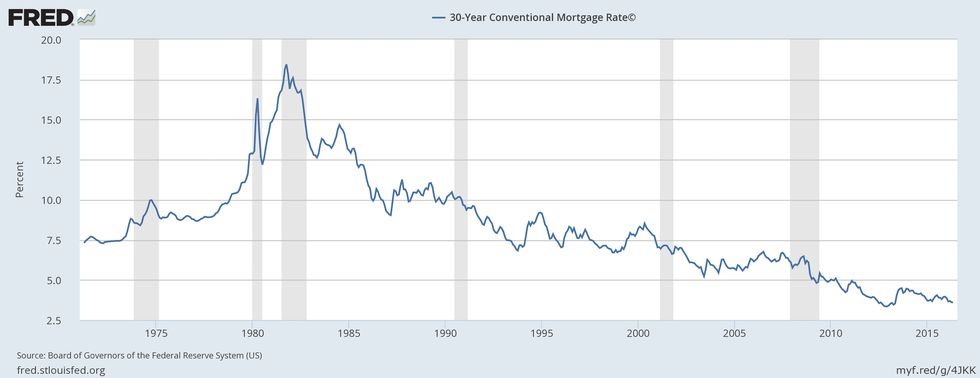Brexit may be a historic event happening overseas, but the surprising move will affect your own home sooner than you think.
Chances are, it already has.
When the United Kingdom voted in a referendum June 23 to leave the European Union (aka Brexit), people got nervous. Really nervous. And when investors, homeowners and the overall economy suffer from that nervousness, it has a global ripple effect — even when it comes to households on the other side of the Atlantic Ocean.
But how exactly will it affect home values in the United States? Read on for the no-nonsense answers every homeowner needs to know.
1. Mortgage Rates Will Be Lower
Beyond its effects on the overall global economy, Brexit's most obvious and important impact on the United States is how it will affect the interest rate channel — and consequentially, home mortgages.
"Because of the uncertainty on the horizon, interest rates are likely to be even lower for even longer," says Christopher Palmer, assistant professor of real estate at University of California Berkeley's Haas School of Business. "Low interest rates are a mixed bag. They make owning a home more affordable, which helps both first-time buyers and those trading up or purchasing a vacation home, but they're also a sign of a weak economy."
Mortgage rates had already hit rock bottom this year, according to Svenja Gudell, chief economist at Zillow, and they're dropping futher.
"Results of the vote drove already-low rates even lower," says Gudell."Currently they're hovering right around 3.34 percent, and that's extremely low for a 30-year fixed mortgage."
Since mortgage rates move slowly, they likely won't make a significant dent in the economy right away. Still, it's good news for people who are locking in their mortgage rates or looking to refinance.
"If people are currently shopping, they'll probably save a couple of bucks as they're trying to get a mortgage," says Gudell."If you were on the fence about refinancing, now might be a good time to reconsider that because it could be worth more."
In the long run, Fortune points out that lower mortgage rates will equate to higher home prices, since they help homebuyers afford a pricier home with the same income.
2. Demand For Luxury Housing Will Rise
For many years, London has been what's called a "Gateway City." These are cities with stable housing markets, where investors feel comfortable buying real estate. Now that the future of the United Kingdom's economy is so uncertain, however, foreign investors will likely turn to Gateway Cities in the United States.
"A Chinese investor with a lot of money in their checking account, who's nervous about the day-to-day fluctuations in the value of the Chinese yuan, wants to put it in a safer spot," says Palmer. "Traditionally that's been real estate in places like London, New York City and San Francisco."
Central London has been a safe haven real estate market for many investors. In 2013, roughly 75 percent of new Central London homes were purchased by foreign buyers, reports Yahoo Finance. About 44 percent of buyers were from Singapore, Hong Kong and China, while others hailed from the Middle East and Russia.
As investors shy away from investing in London markets, however, demand (and therefore prices) of housing in cities like New York, San Francisco, Boston and Seattle will increase. Since investors often look to the top of the market, this trend will affect luxury housing most at first.
"You would certainly see the biggest effects at the top of the market, but the housing markets are all interconnected," says Palmer. "So albeit muted, there's an effect when the top of the market is in a frenzy. That pushes people out of the top of the market, and they end up in the next segments, so there's a bit of trickle down."
If you're looking to sell luxury housing, Brexit will likely mean a bigger profit for you down the road. If you're in the market for luxury housing, you may have a more difficult time finding it as demand increases.
3. You'll See Fewer British Homeowners Buying In The United States
While investors from other countries may turn to the United States, British homebuyers will have a more difficult time purchasing property across the Atlantic.
"If a typical British homebuyer were to purchase a typical home in the United States, it would actually cost them £10,000 more, just from Thursday until now," says Gudell. The United States has been the second most common destination, after Australia, for United Kingdom emigrants. The most recent data available shows that 23,000 emigrants leave the United Kingdom for the United States each year, reports The Telegraph.
However, if enough foreign investors turn to the United States rather than other countries' Gateway Cities (say, Vancouver), the effect of fewer British homebuyers may go unnoticed.
4. It Will Benefit REITs
A real estate investment trust (REIT) allows anyone to invest in large-scale properties through stock, the same way they might invest in other industries. REITs are considered safe investments, offer yield and provide an alternative to the more volatile U.S. stock market.
Though REIT stocks have fallen slightly since the Brexit announcement, they continue to outperform broader markets and have performed far better than Nasdaq and S&P. Investors' interest in REITs decreased last year as they expected higher interest rates elsewhere, but REITs could now be a solid choice for a nervous investor, reports CNBC.
5. But Brexit Shouldn't Affect Your Buying Decisions… Yet
Yes, Brexit will likely affect the overall housing market in the United States and your home's value. But that doesn't mean you should make a real estate investment right now.
"The reality for the everyday buyer here in the United States is that if you couldn't afford a house last week, you won't be able to afford a house now," says Gudell."Homes aren't the immediate go-to investment. It's probably going to be a longer-tailed development on that front."
Still, it's worthwhile to keep track of how Brexit is affecting the United States housing market, and consider shorter-term moves like refinancing your home, if appropriate. If you do feel the need to invest right away based on the results of Brexit, Gudell recommends investigating treasuries or other short-term investments.

















